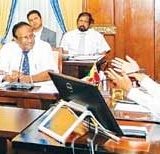19th amendment only half way measure to abolish executive presidency in Sri Lanka
A key amendment adopted by Sri Lankan parliament last week is only a halfway measure towards abolishing executive presidency as only 60 to 65 per cent of powers of the top post have been reduced, according to an architect of the legislation.
“The government itself has gone public saying that it could not go the full distance,” Jayampathi Wickramaratna, a constitutional lawyer who was involved in drafting the 19A, said.







